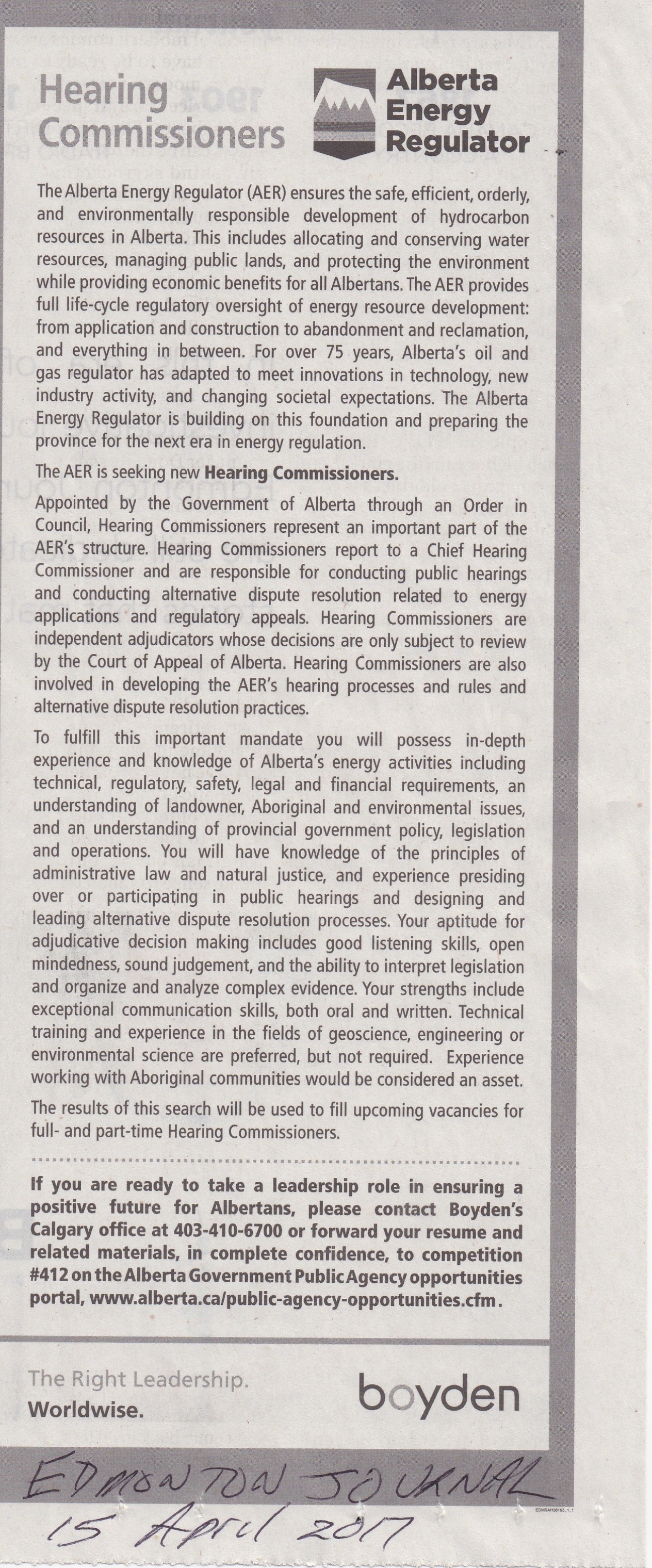Alberta Energy Regulator advertises for Hearing Commissioners
In the 15 April edition of the Edmonton Journal an ad appeared seeking interested individuals to apply for a position as a Hearing Commissioner with the Alberta Energy Regulator (AER). The request for applicants proclaimed that “The AER ensures the safe, efficient, orderly, and environmentally responsible development of hydrocarbon resources….and protecting the environment while providing economic benefits for all Albertans… and provides full life-cycle regulatory oversight of energy resource development: from application and construction to abandonment and reclamation, and everything in between.” [Emphasis added] Pretty powerful regulator! Perhaps too powerful? Why should the public care?

Historically, vacancies on government boards were not advertised. Under Ed Stelmach, progress was made to require boards to advertise for board positions. Today we have a situation where incumbent boards are exercising too much discretion in determining what skill sets should go into a recruitment process. The above advertisement is likely to discourage “outsiders” to apply.
In a recent post [Baby steps at AIMCo board], the removal of the highly restrictive qualification for AIMCo directors (“proven and demonstrable experience and expertise in investment management, finance, accounting or law or experience as an executive or a director in a senior publicly traded issuer) was praised. Likewise, the qualifications for Hearing Commissioners might be seen as absurdly, or unnecessarily, high and carefully biased to those with an “understanding” (and acceptance?) of the current system.
Criteria for successful applicants include: “in-depth experience and knowledge of Alberta’s energy activities including technical, regulatory, safety, legal and financial requirements, an understanding of landowner, Aboriginal and environmental issues, and an understanding of provincial government policy, legislation and operations.” Not only does the successful candidate appear to have to have worked in this field for their entire work life, they also must “have knowledge of the principles of administrative law and natural justice, and experience presiding over or participating in public hearings and designing and leading alternative dispute resolution processes.” This seems to be code for a lawyer. Furthermore “Your aptitude for adjudicative decision-making includes good listening skills, open mindedness, sound judgment, and the ability to interpret legislation and organize and analyze complex evidence,” adds to an already long list of relatively scarce pool of applicants.
In addition to filtering qualified candidates the ad suggests that “Technical training and experience in the fields of geoscience, engineering or environmental science are preferred, but not required.” [Emphasis added]
It’s not clear whether such a person exists. Certainly personnel with the Pembina Institute might meet some of the requirements, but still might be given a pass on the basis of being short on the administrative law or knowledge of financial or safety requirements.
Such ads underline the challenge a new government faces with bureaucratic and regulatory forces which appear to serve the interests that are being regulated. Who outside the industry and the energy bureaucracy would put their credentials forward in the face of such a high bar? Is there not some on-the-job training for those with a generalist background?
The flow back and forth between the Energy department and AER and the industry is a well-known feature of “the system.” It is time for the government to take leadership in the appointments process to protect the public interest against the natural inclination of the industry’s self-interest to foster “sound judgment” when key regulatory decisions are made.